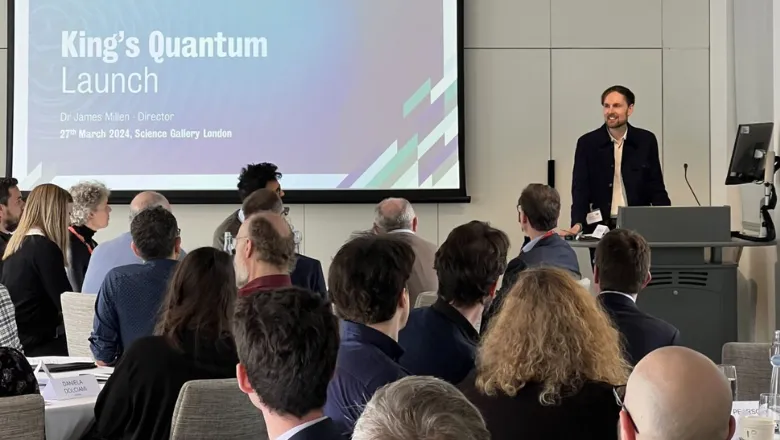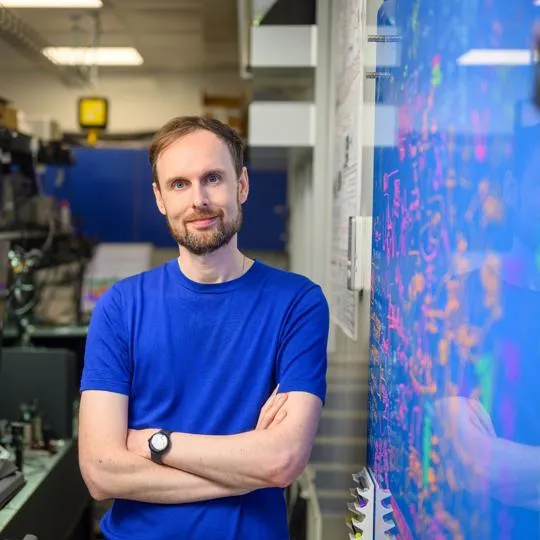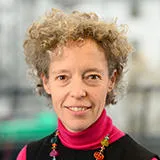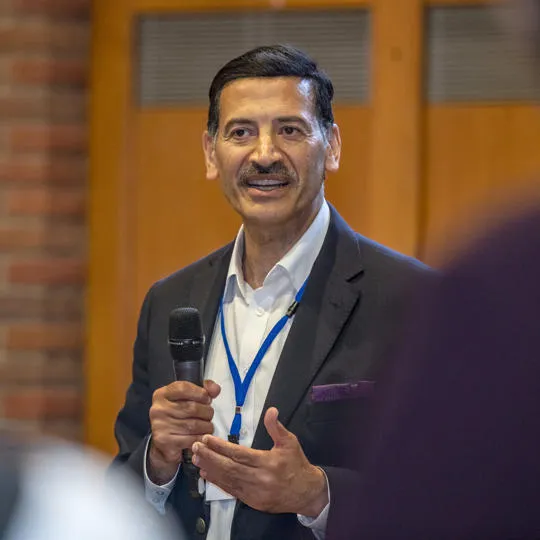“Quantum not only explains the world, but through quantum we can change the world.”
Dr James Millen, Director of King’s Quantum
14 April 2024
King's launches new quantum research centre
King's Quantum aims to leverage transformative quantum technology for healthcare, life sciences, and industry.

A new research centre - King’s Quantum - has been launched at King’s College London with the aim of delivering transformative quantum technology for healthcare, life sciences, security and industry.
Announced recently at the Science Gallery London before an audience of researchers, business and industry representatives, and policy-makers, the centre is part of a £45m investment in science at King’s. Its goal is to leverage multidisciplinary expertise and knowledge across the university to further the application of quantum science.
Dr James Millen, Director of King’s Quantum, said: “Quantum has the power to unlock solutions to global challenges such as net zero, climate forecasting, drug discovery, autonomous vehicles, and the development of new materials for a wide range of purposes.
“Quantum not only explains the world, but through quantum we can change the world.”
Quantum science provides a description of nature from the subatomic to the molecular scale. Quantum technologies exploit unique aspects of quantum science, such as superposition and entanglement, and integrate them into devices to achieve things that would otherwise be impossible.
“Our centre aims to bring together our amazing pool of quantum scientists at Kings with the even larger pool of researchers who have the potential to apply quantum technology in their work, bringing about innovations in the field," Dr Millen said.
Whether its quantum computers processing information so that we can design new drugs, or quantum sensors interacting with the environment so delicately that they can sense the gravity of objects underground, quantum technologies are widely recognised as transformative in every domain.
A key focus for the centre will be fostering collaboration between academics and industry to realise the technological revolution enabled by quantum.
At the launch event, representatives from a range of businesses heard about the opportunities across a range of sectors including healthcare, security and cryptography, simulation and materials design, and quantum sensors. The team is interested to hear from prospective partners in exploring potential application areas.
Professor Bashir M. Al-Hashimi, Vice President (Research & Innovation) at King's College London, said: “King’s is well placed to design commercial spinouts in this exciting area of science. Forging collaborations and partnerships enables us to produce life-changing research, and that’s the approach we’re taking at King’s.”
"...King’s is championing the power of interdisciplinary, forward-looking science, not only to deliver research breakthroughs of the future, but also in teaching that inspires our students to find solutions to complex problems."
Professor Rachel Bearon, Executive Dean of the Faculty of Natural, Mathematical & Engineering Sciences
King’s Quantum is guided by the UK government’s National Quantum Strategy to deliver benefits to the economy, society and national security through quantum technologies.
The launch event also heard from Faiyaz Amin, Senior Policy Advisor (Department for Science, Innovation and Technology), who identified quantum as one of the five critical technologies for the UK.
He said, “We need to invest in the skills of people who work in quantum and we need to support businesses in order to drive development of quantum technologies, communicate the benefits of quantum, and establish environmental regulations to maintain ethics in quantum use.”
Professor Rachel Bearon, Executive Dean of the Faculty of Natural, Mathematical & Engineering Sciences which hosts the centre, said a key for developing King’s Interdisplinary Sciences is developing high-profile research centres.
“By investing in research centres like King’s Quantum, King’s is championing the power of interdisciplinary, forward-looking science, not only to deliver research breakthroughs of the future, but also in teaching that inspires our students to find solutions to complex problems."
King’s Quantum is committed to growing its research community, and would encourage scientists at any career stage to contact quantum@kcl.ac.uk to discuss getting involved. The centre will be accepting PhD students in early 2025.



